- Home
- Priscilla Royal
Sorrow Without End Page 8
Sorrow Without End Read online
Page 8
“Satan’s tits,” Ralf exploded. “It’s the wild man I saw when I came here with the corpse.”
“Mad, methinks.”
“Or possessed?”
“He does not blaspheme as do those possessed,” Thomas said as the man turned his back and danced away from them. “And he dances rather than foaming at the mouth and rolling on the ground. I wonder if he is afflicted with the dancing mania?” He frowned. “Yet I see no others so touched. Sister Anne once told me that these most often come for care in numbers, not alone. She might find this one most interesting.”
“If he can be caught.” Ralf pointed to two lay brothers running down the hospital aisle.
The object of their frantic chase danced in ever decreasing circles and laughed with crazed merriment. “Monks here. Monks there,” he sang.
“Do you get many mad ones here, Brother?” Ralf asked, scratching his head.
“’Tis rare. In London we had more…”
Ralf snorted. “London is a house for the mad, my friend.”
“The inhabitants often come from the country, Crowner. Like this one…”
“They’ve caught him.” Ralf nodded as he watched the lay brothers leading the man away, his head now bent, his body limp and docile. “I never understood the pleasure men find in visiting the mad,” the crowner said. “It is cause for grief, not laughter, when men lose their ability to reason.”
“Perhaps they jest out of gratitude that God has not chosen to curse them with similar suffering?”
“Then they are mad to do so. The difference between a man possessed of his wits and one whom God has cursed with the loss of them is this thin.” Ralf held two fingers but a fine line apart.
“In my absence, you have become philosophically inclined, Ralf.”
“Never, monk. This beastly rain must be blamed for washing too much reason from my head.”
Thomas nodded, then turned back to watch the madman. Suddenly, the man looked around. His eyes widened as if in terror as he stared at the monk. Thomas shuddered. “Why look at me so?” he whispered.
Ralf, too, had noticed the madman’s look.
Chapter Sixteen
Ralf looked up at the darkened sky. Not only was the rain relentless, the sea wind gave it a cutting edge. Shivering, he scurried into a sheltered spot in the hospital courtyard. He had a job to do, and cold work it was for cert.
Surely, the murderer must be here. Only a fool would have continued on in this weather. Scrutinizing the few people that still moved about in the dimming light, Ralf decided that the clever man would have feigned some illness, when he saw the crowds at the hospital gates. Thus he would have found a safe haven, hiding amongst the many sick, while getting a hot meal and a dry bed in the bargain. He might even have persuaded Sister Christina to pray for his bloodstained soul. With that thought, Ralf’s mood turned even grimmer.
Aye, he was convinced this is where the murderer must have come and that no sensible killer would have drawn undue attention by asking for a traveler’s shelter here when the inn offered not only clean accommodations but food and drink more congenial to the secular taste. Even pilgrims, many of them families escaping the smithy or the shop to refresh their spirits at some holy spot, preferred a meaty stew and good wine or ale to the lean monastic diet offered by Tyndal Priory. In fact the prioress had confirmed, with an expression suggesting no regret, that the new inn had certainly taken that custom away. Few healthy people, except an occasional monk, had requested shelter for months. If truth be told, she had added after some thought, not many monks had either over the last several weeks.
Thus he had sent Cuthbert off to the innkeeper to ask about travelers arriving this day or if any others had returned to the inn after leaving it earlier. There were none of either, the innkeeper had confirmed. The foul coastal weather had not only kept his own custom from leaving, but it had prevented others from arriving. Those staying on had more than made up for any new travelers, the innkeeper had added, patting his stomach in satisfaction, for they chose to sit downstairs, where he kept a fire roaring, and cry out for drink to warm their damp bones where the fire could not.
Ralf shook his head. He’d rather question healthy strangers in a comfortable inn, where he might enjoy a hot stew with good ale himself, than examine the sick for any well enough to slice into a man as if he were cleaning game. Since he had been the one to conclude that the killer was here, he would take the responsibility for searching Tyndal. Of course, he could be wrong and have lost the killer entirely by looking no farther than the priory. Might he or the murderer be the more foolish?
Ralf growled to himself. He was not a happy man. When he had left Thomas at the entry to the monks’ quarters, he soon fell into a particularly foul mood. After seeing what violence mortals did to each other during his years as a soldier and then as crowner, Ralf doubted that fork-tailed imps ever leapt out of smoky holes to do evil unto men. Nonetheless, he did suspect that invisible ones were sent by the Prince of Darkness to invade even honest men’s souls, troubling their spirits so they could do naught but cruel and sinful acts until the imp was satisfied.
Ralf knew that he had most certainly done and thought things he should not, only to feel the shame of his sin when reason chased the fetid stench of evil from his soul. Even today, within a few hours, he had not only lusted after a nun but had felt base desire for Gytha, the sister of his childhood friend. When she had brought him a hearty meal of bread and cheese, teasing him as she was wont to do about the roars of his empty belly keeping godly souls awake, he had suddenly realized that she was no longer a child but a finely formed woman. As she walked away, he had enjoyed the sight of her rounded buttocks and slim waist, then recoiled in horror when his manhood had stiffened.
I may be more sinful than most men, Ralf thought with embarrassment, but surely the Devil’s minions make as merry with monks as they do with crowners. Had a like creature dug into Thomas’ soul like some demonic weevil, causing corruption there? Was the monk not hiding something? Why had he behaved as he did with the corpse? And what of the madman? Why had he looked on Thomas with so much terror? Was there a connection or were these incidents quite coincidental, meaningless?
“’S blood!” the crowner spat with anger.
A man nearby jumped as if he had just seen Satan himself.
Shoving aside lingering thoughts of soft breasts for the rougher lure of solving a murder, Ralf ignored the fellow and walked into the hospital. He was wasting time watching these pitiful few, so desperate that at this late hour they still stood soaked and chilled, waiting for someone to see to their pain and ills. The murderer would have long since found shelter inside.
***
The crowner shouted to a lay brother.
“Aye, Crowner,” Brother Beorn said as he gestured for a woman with six children to come closer. Even in this poor light, one could see that the children’s faces were covered with little red spots.
“Your madman. What have you done with him?”
“He sleeps, praise be to God!”
“I would speak to him.”
“Let him be. Sister Christina has calmed him with her prayers. He makes little sense and awake would once more cause havoc amongst us all. Have mercy on the dying and the sick, Crowner, if not on those who must tend him.”
Brother Beorn knelt down in front of one child. Just as he did, the little girl vomited on his robe, then raised her face to the sky and wailed. The man took his sleeve, gently wiped her face clean, and shrugged as if it were nothing when the mother wrung her hands with frustration and embarrassment.
Ralf frowned. Was he mad to think that questioning someone so bereft of wit would be of any value? Then he shook his head as he thought about his last encounter with the man. Surely the fellow was not mad at all, despite his odd dancing. The words the man had spoken held more wit than the speech of many who claimed greater ones. Had Ralf been one to play at dice, he would have bet that th
e dancing was an act, and that act did not ring like any king’s freshly minted coin. Besides, Brother Andrew had sent word that he could find no one who had seen the man enter the priory gate, and Ralf did find the encounter with Brother Thomas most curious.
That settled it. He would talk to the madman even if doing so meant the man would scuttle up the walls to the wooden beams above, dance on those rafters, and wake the dead in all the graveyards of Tyndal Priory.
Ralf lifted his fist and shook it at the lay brother. “See this? Should he show signs of straying, I will make him sleep once more.”
Brother Beorn grimaced, then spoke to a lay sister about the children and, with weary resignation, gestured at Ralf to follow him.
***
Ralf shook his head when he saw that no one was on watch at the private hospital cell. “You left none to guard him despite his wildness?” he asked the lay brother.
“We have few enough to care for these.” Beorn gestured at the rows of sick, moaning and praying for respite. One man sat up, gasping for air, and a lay brother rushed to his side. “We are healers, Crowner, not soldiers guarding prisoners.”
“You have not even sent a priest to exorcise him?”
“Sister Christina will see him again soon. Her prayers heal as often as exorcism. After her last visit, he fell into a sleep more peaceful than either the mad or possessed are wont to do.” He glared at Ralf. “We had considered that a blessing.”
Ralf ignored the hint. “I will send word for you to come when I leave so he will not be left unattended.”
Beorn’s eyes narrowed and he hesitated as if he would say something further, then turned and marched away in silence.
***
The man was truly sleeping, if his loud snores were genuine. Asleep, he did not seem any different from other men, Ralf thought as he studied the man’s face. Perhaps sleep, like death, healed the mortal ills of many men?
“Fa!” he muttered. “I am beginning to sound like one of my courtly brother’s foppish poets.” He spat, then took a few more moments to look the madman over carefully.
The fellow did not appear to be a wandering felon. Both ears were intact and his nostrils were not slit, although the nose had been broken just below the bridge at some time past. Had he been in a street brawl or had he been a soldier?
Ralf studied the one visible hand. All fingers were present, although crisscrossed with many white scars. This was a man who had worked with knives, perhaps, or other sharp things. Had he been a craftsman before he had, willingly or not, discarded his reason?
The man shifted from his side onto his back. There was no sign of a crusader cross, nor was there any other indication that he had been a man of arms. The cut of his robe was monkish in its simplicity with a bunched cowl around the neck and a rope tied around his waist. The cloth was unbleached, dirty and rough, but bore no mark that would distinguish him as belonging to any particular Order.
The faded reddish color of his face did suggest to Ralf that the man was either fond of drink or had spent time in a more southern climate. Perhaps the man was one of those wandering preachers like Peter the Hermit who had taken aged men, women, and even children off to Outremer to fight with just their staves, fists, and faith, then left his followers to die or be sold into slavery. Peter the Hermit, unlike his converts, had escaped.
Ralf shook his head. He had only contempt for those who drew the ignorant and innocent into mad plans that brought only sorrow to the followers. He hoped this man was not such a creature. If so, the crowner might be sorely tempted to give him a taste of what the man had left others to suffer.
Suddenly Ralf realized that the man was now quite awake and staring at him.
“You wish to speak with me?” The man’s voice was hoarse, as if he were unaccustomed to using it or else had done so far too much. As he pushed himself upright, he pulled his cowl over his head, then quickly shoved it back with an inexplicable change of mind.
“You are not mad at all, are you?”
“What is madness, Crowner?”
“I did not come to play with words. What do you call yourself?”
The man spread his arms. “Adam? Jesus? Beelzebub? All suit.”
Ralf grabbed the man by the collar of his robe and pulled him upright. “Do not play the fool with me. Your time for feinted babble is over. Oh, you may dance for me if you will, but, as you prance, think on this: those that dance for me usually do so at the end of a rope.”
“Gibberish may be my tongue, but the gibbet will never be the ceiling over my head. What words would you have with me in the English tongue and under this holy roof?”
For all his cocky words, Ralf saw fear flicker in the man’s eyes and he was pleased. He pushed him back on the bed. “Who are you?”
“No one of note. I am a free man, a pilgrim seeking a cure for an invisible wound.”
Aren’t we all? Ralf thought. “Surely not madness,” he said with contempt. “Why play that game?”
“Is it madness to fear Satan’s henchmen hiding in the forests along the road or cutpurses amongst bands of travelers? I have been left in peace while others have been attacked. Knowing that, which would you say was mad?”
Ralf visibly clenched one fist, relaxed it, then clenched it again. “What road did you take to Tyndal?”
“The one that runs by your village.”
“No one saw you enter the priory gates.”
“Am I to be condemned because mortal men are blind? I am here, am I not? I did not float over the walls like some hellish imp. Satan would not want this thin soul of an honest pilgrim when there are fatter souls to fry.”
Ralf waited. The man said nothing further. “Whom did you see between the village and the priory gates?”
“None.”
Ralf bent over the man, his nose almost touching the other’s. “I smell the rank stench of a liar. A man has been murdered on that road, and, if you do not cooperate, I assure you that slowly pulled teeth will hurt less than my methods.”
The man drew back, his color now quite white. “Do not press me so, good sir! Some madness I may feign, as you say, but only to save myself from harm. Yet not all you see is false. Did I not tell you that I suffered from an invisible wound?”
“The stench grows, knave!”
“Have mercy!” the man whined. “If the sainted William is to cure me, I must not offend either the saint or God. Surely I would do so by pointing an accusing finger at one who may serve Him.”
“And what mean you by that babble?”
The man tried to turn away from Ralf, but the crowner grabbed him again by the neck of his robe. “Speak!”
“Do not hurt me! I will tell you,” he whimpered. “A monk. I saw a monk on the road to Tyndal.”
Despite the chill that ran through him, Ralf begin to sweat. He pushed the man back. “Describe him.”
“You stood by him near the chapel. A tall, broad-shouldered man with hair the color of red gold. Early today, I saw him standing at the bend in the road, near the clearing.”
“What more!”
“The wind was howling like the screams of the damned. The monk was so tall, his hair the color of flames. I feared he was no monk at all but the Prince of Darkness himself. Fear turned my feet toward the woods and I fled, coming by accident upon the mill gate entrance. That is why no one saw me at the main gate. I know nothing more, Crowner. I swear it!”
Ralf’s shoulders sagged, but he said nothing further.
Slowly the man backed away, watching to see what the crowner would do. When Ralf did not move, the madman rose from his bed and once more began to dance. This time, his feet moved slowly as if his silent harpist played a most melancholy tune.
Chapter Seventeen
“I swear to you, Ralf, that I did not see him!”
Thomas and the crowner were standing outside the parish church where the monk had just emerged from the sacristy. Cuthbert stood at a discree
t distance.
“He described you.”
“I do not doubt it, but he also saw me when we were standing together near the hospital chapel. If the man is mad, as he appears to be, he could have taken the reality of one sighting and made a fantasy for a prior one. I did not notice him on that road.”
“The man’s madness comes and goes. He may be as mad as you or I.”
“If he is neither mad nor possessed, then he may have other reasons for wanting to cast some suspicion upon me. Perhaps he is the murderer.”
“I have made inquiries. Brother Matthew told Brother Beorn earlier that he had found the man in the village, unable to travel farther due to his affliction. According to the lay brother, your fellow monk believes the man to be a true penitent who, quite sadly, must travel to Norwich for a final cure at the shrine of Saint William. In the meantime, he sent him here, claiming that Sister Christina’s prayers might give him a short respite so that he could continue on to Norwich.”
“That does not mean he did not commit the crime.”
“Look at him, monk,” Ralf said impatiently. “He is as tall and slender as your Brother Matthew, not a man likely to win a struggle with a soldier. Besides, he was sweating like a horse when he told his tale about you and wailed like a child that he would be sent to Hell for pointing any finger at a priest. As I told him, monk, I am in no mood for word jousts. I have a murder to solve. What did you see on that road that you have failed to tell me?”
Thomas fell silent. “I am trying to remember if I passed him or…”
Ralf cut him off. “You are sure you did not pass by the clearing? You are sure you saw no one?”
“As I have said, I also took the shortcut through the woods to the mill gate. I did not go around the bend in the road nor see the clearing. Perhaps he was behind me and I noted him not, but he was wrong if he claims I went farther than I did.” The monk’s mouth twitched with the effort to retain self-control.

 The Twice-Hanged Man
The Twice-Hanged Man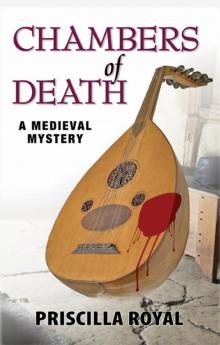 Chambers of Death mm-6
Chambers of Death mm-6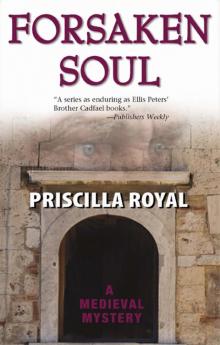 Forsaken Soul
Forsaken Soul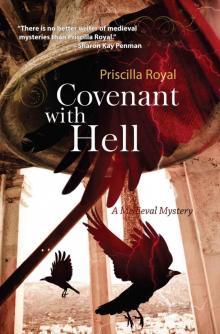 Covenant With Hell (Medieval Mysteries)
Covenant With Hell (Medieval Mysteries)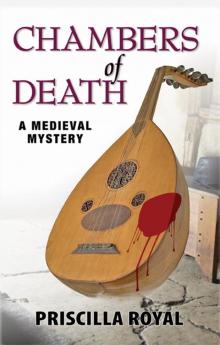 Chambers of Death
Chambers of Death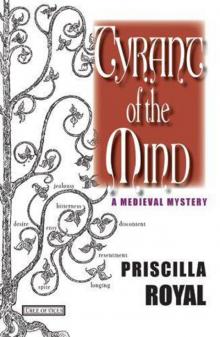 Tyrant of the Mind
Tyrant of the Mind Wild Justice
Wild Justice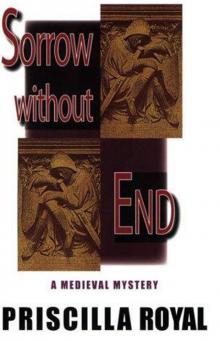 Sorrow Without End
Sorrow Without End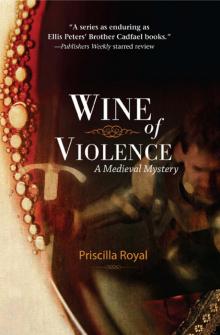 Wine of Violence
Wine of Violence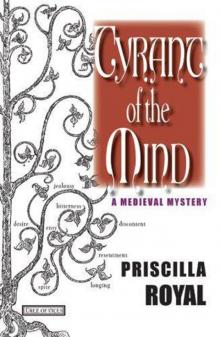 Tyrant of the Mind mm-2
Tyrant of the Mind mm-2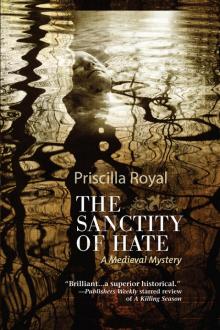 The Sanctity of Hate
The Sanctity of Hate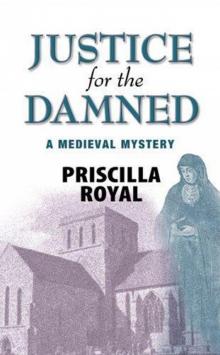 Justice for the Damned
Justice for the Damned The Proud Sinner
The Proud Sinner A Killing Season mm-8
A Killing Season mm-8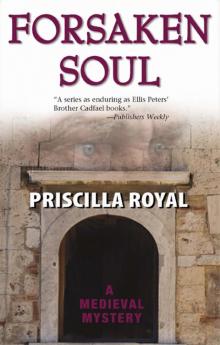 Forsaken Soul mm-5
Forsaken Soul mm-5 Valley of Dry Bones mm-7
Valley of Dry Bones mm-7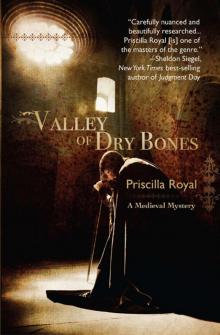 Valley of Dry Bones
Valley of Dry Bones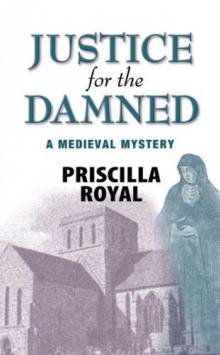 Justice for the Damned mm-4
Justice for the Damned mm-4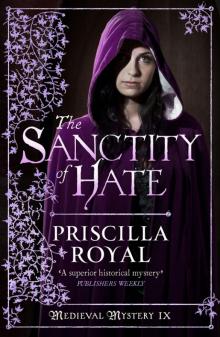 Sanctity of Hate
Sanctity of Hate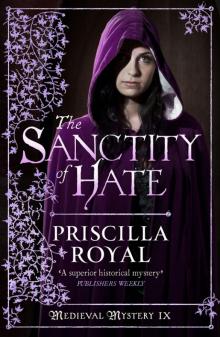 Sanctity of Hate mm-9
Sanctity of Hate mm-9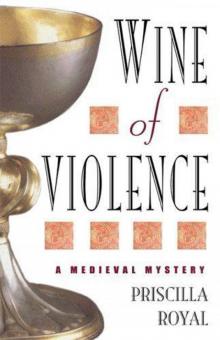 Wine of Violence mm-1
Wine of Violence mm-1